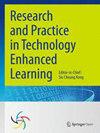Interest-Driven Creator Theory: case study of embodiment in an experimental school in Taiwan
IF 3
Q1 EDUCATION & EDUCATIONAL RESEARCH
Research and Practice in Technology Enhanced Learning
Pub Date : 2022-12-12
DOI:10.58459/rptel.2023.18023
引用次数: 5
Abstract
Cognisant that the examination-driven culture in most Asian schools will hinder future educational innovation, a group of concerned Asian researchers started collaboration in 2014 to develop a theory to serve as a guide to design interest- driven learning activities. This endeavour then spawned the development of the Interest-Driven Creator (IDC) Theory. The theory postulates that when their learning is driven by interest, students can be engaged in knowledge creation. The continued practice of this creation process in their daily learning routines can lead students to excel in learning performance, develop 21st century competences and eventually form creation habits to be lifelong learners. This paper, therefore, adds on to the current articulation of IDC Theory by highlighting the implementation of an IDC experimental school in Taiwan and by presenting the story of how it embodies the spirit of IDC. The school curriculum prepares students to be lifelong readers and reflective writers with broad knowledge in the fields of Math, English Language, Science, and Interdisciplinary Social Studies. It emphasises not only students’ academic growth but also their physical wellness and character building. The endeavour intends to be a comprehensive example of practice-driven research, demonstrating how theory and practice can be bridged, and how a virtuous cycle of research improving practice and practice informing research can be developed. This paper also provides a glimpse of how IDC Theory can inspire the planning and integration of IDC-based education approaches in academic curricula beyond Taiwan. The paper ends with the call for a more concerted effort to create a sustainable alliance to share professional insights into IDC Theory through a non- governmental organisation.兴趣驱动创造者理论:台湾一所实验学校的个案研究
认识到大多数亚洲学校的应试文化将阻碍未来的教育创新,一群相关的亚洲研究人员于2014年开始合作开发一种理论,作为设计兴趣驱动学习活动的指导。这种努力催生了兴趣驱动创造者(IDC)理论的发展。该理论认为,当学生的学习受到兴趣的驱使时,他们就可以从事知识创造。在日常学习中不断实践这种创造过程,可以使学生在学习表现上脱颖而出,培养21世纪的能力,最终形成终身学习者的创造习惯。因此,本文透过台湾一所国际数据中心实验学校的实施,以及它如何体现国际数据中心精神的故事,来补充国际数据中心理论的现有表述。学校的课程使学生成为终身读者和反思作家,在数学、英语语言、科学和跨学科社会研究领域拥有广泛的知识。它不仅强调学生的学术成长,还强调他们的身体健康和品格建设。该项目旨在成为实践驱动型研究的一个全面范例,展示理论和实践如何能够架起桥梁,以及如何形成研究改善实践和实践为研究提供信息的良性循环。本文也提供了IDC理论如何启发台湾以外的学术课程规划与整合基于IDC的教育方法。论文最后呼吁建立一个可持续的联盟,通过一个非政府组织来分享IDC理论的专业见解。
本文章由计算机程序翻译,如有差异,请以英文原文为准。
求助全文
约1分钟内获得全文
求助全文
来源期刊

Research and Practice in Technology Enhanced Learning
Social Sciences-Education
CiteScore
7.10
自引率
3.10%
发文量
28
审稿时长
13 weeks
 求助内容:
求助内容: 应助结果提醒方式:
应助结果提醒方式:


